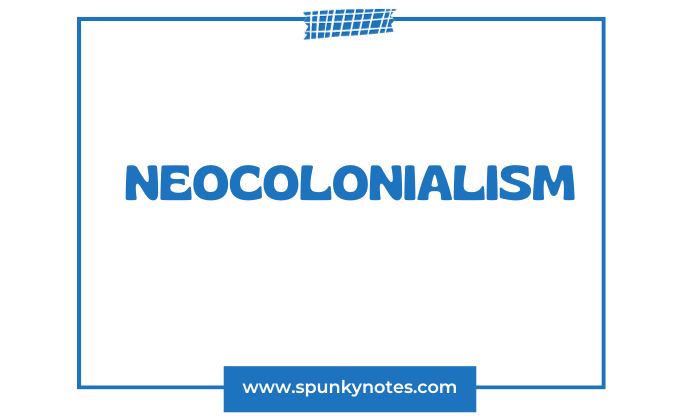

Estimated Reading Time: 7 min
Q. Write a detailed note on Neocolonialism.
Neocolonialism
The term “neocolonialism” is a compound word composed of two parts: “neo-” and “colonialism.”
Neo-: A prefix from the Greek word “neos,” which means “new.” It is commonly used in English to denote a new form or version of something.
Colonialism: This part of the word comes from the Latin “colonus,” meaning “farmer,” which later refers to settlers or colonists.
Neo-colonialism is a concept that refers to the indirect and subtle ways in which powerful countries, often former colonial powers, maintain control and influence over less powerful nations or regions.
Unlike traditional colonialism, where a dominant country directly governs and controls a colony, neo-colonialism operates through economic, political, and cultural means. It allows the controlling country to exert its dominance without formal occupation.
Aspects of Neocolonialism
1- Economic Exploitation
One of the primary mechanisms of neo-colonialism is economic exploitation. Powerful nations use their economic leverage to gain control over the resources and markets of less powerful nations.
It can take the form of unequal trade agreements, loans with stringent conditions, or the extraction of natural resources at minimal cost.
2- Financial Institutions
Neo-colonialism often involves international financial institutions such as the International Monetary Fund (IMF) and the World Bank.
These institutions provide loans and financial assistance to countries in need, but they often attach conditions that require economic reforms favouring the interests of the lending countries. These conditions can perpetuate dependency and economic control.
3- Political Influence
Powerful nations may exert political influence over weaker nations by supporting specific leaders or governments that align with their interests. It can involve interference in elections, military support, or diplomatic pressure to advance their geopolitical agenda.
4- Cultural Hegemony
Cultural imperialism is another facet of neo-colonialism. The dominant nations spread their cultural values, norms, and ideologies through media, education, and popular culture. It can lead to the erosion of indigenous cultures and the imposition of Western ideals.
5- Debt Burden
Many less developed countries accumulate significant debt to powerful nations and international institutions. When countries have to pay off a lot of debt, they might have to cut spending on things like health care and building roads.
This can make them weak and open to pressure from other countries that want something from them.
6- Globalization
Neo-colonialism is closely linked to globalization. The global economic system often perpetuates inequalities, benefiting powerful nations and multinational corporations at the expense of weaker nations. This unequal distribution of wealth and resources reinforces neo-colonial dynamics.
7- Resource Extraction
Powerful nations may secure access to valuable natural resources in less developed countries, often at the expense of local communities and the environment. These resources are then used to fuel the economic growth of the dominant nations.
8- Dependency
Neocolonialism creates a state of dependency where weaker nations rely on more powerful ones for trade, aid, and investment. This dependency can limit their ability to make independent decisions and pursue development goals.
Who coined the term Neocolonialism?
Kwame Nkrumah
The term “neocolonialism” is often attributed to Kwame Nkrumah, the first Prime Minister and President of Ghana. He used the term to describe the post-colonial exploitation of the less developed countries by the more developed capitalist countries.
Nkrumah discussed the concept in depth in his book “Neo-Colonialism, The Last Stage of Imperialism,” which was published in 1965.
The term has since been used in political and economic discussions to critique the ongoing relationship between former colonial powers and colonies, where the former still maintains significant economic and sometimes political influence.
Jean-Paul Sartre
The French philosopher and writer Jean-Paul Sartre also discussed the concept of neocolonialism. Sartre was a prominent intellectual who addressed various political issues, including colonialism and post-colonialism.
He used the term “neocolonialism” in his preface to Frantz Fanon’s seminal work “The Wretched of the Earth” (1961), which analyzed the nature of colonialism and the conditions of the native peoples under colonial rule.
Sartre’s preface helped popularize the term and the concept, which became influential in post-colonial studies and political discourse.
The term “neocolonialism” was discussed by both Kwame Nkrumah and Jean-Paul Sartre, making it difficult to credit its coinage to one individual. The evolution of such terms into the public lexicon is often a complex process.
Sartre discussed neocolonialism in 1961, while Nkrumah provided a more detailed exposition in 1965. Both contributed significantly to the term’s prominence in academic and political discourse.
Jean-Paul Sartre did write about neocolonialism in the preface to Frantz Fanon’s “The Wretched of the Earth,” published in 1961.
However, Kwame Nkrumah, in his 1965 book “Neo-Colonialism, the Last Stage of Imperialism,” elaborated extensively on the concept as it related specifically to the African context and the post-independence era.
It is possible that the term was in use before either Sartre or Nkrumah published their works, as the concept could have been discussed in political circles. However, in terms of popularizing and elaborating on the concept in a way that had a lasting impact on discourse, both men played significant roles.
Differences Between Colonialism and Neocolonialism
Colonialism
- Direct political control: Colonial powers ruled over colonies with a direct administrative and military presence.
- Territorial occupation: Colonialism involves the physical occupation of a territory by a foreign power.
- Resource extraction: The colonial powers exploited the colony’s resources for their own benefit, often depleting local wealth.
- Cultural imposition: The colonizers imposed their culture, language, and institutions on the indigenous populations.
Neocolonialism
- Indirect control: Neocolonialism exerts influence through economic, political, and cultural pressures rather than direct political rule.
- No occupation: There is no formal occupation of territory; the control is often economic or through other forms of influence.
- Economic exploitation: Neocolonialism often takes the form of economic dominance, such as control over trade, investment, and debt.
- Subtle cultural influence: Cultural influence is exerted through media, consumer culture, and the promotion of the former colonial power’s values.
Colonialism is like a boss living in a person’s home, issuing orders, taking items, and enforcing a particular way of life. Neocolonialism is when the boss moves out but controls the person’s money, dictates purchases, and influences thoughts from a distance.
Neocolonialism vs Colonialism
| Aspect | Colonialism | Neocolonialism |
|---|---|---|
| Control | Direct governance and administrative control by a foreign power. | Indirect control, often through economic and political means. |
| Presence | Physical occupation and territorial annexation by the colonizer. | No physical occupation; influence is covert and informal. |
| Economy | Exploitation and extraction of resources for the colonizer’s benefit. | Economic manipulation to maintain dependence and favor the former or other powerful countries. |
| Politics | Foreign political structures and laws are imposed directly. | Political influence or control is exerted indirectly, such as through puppet governments. |
| Culture | Assimilation into the colonizer’s culture by force. | Cultural influence is exerted through media and consumerism. |
| Sovereignty | Colonized regions lack sovereignty and self-governance. | Countries are officially sovereign but may be economically or politically dependent. |
| Methods | Military conquest, rule, and administrative control. | Economic pressure, cultural hegemony, and political diplomacy or coercion. |
Imperialism is a broader term that encompasses both colonialism and neocolonialism. It refers to the policy of extending a country’s power and influence through colonization, military force, or other means.
Imperialism encompasses a broader agenda that includes both colonialism and neocolonialism. It represents the ambition to establish and uphold an empire.
Colonialism sets up colonies to achieve imperialistic goals, while neocolonialism is the subtle persistence of imperial sway even after the official cessation of colonial rule.

